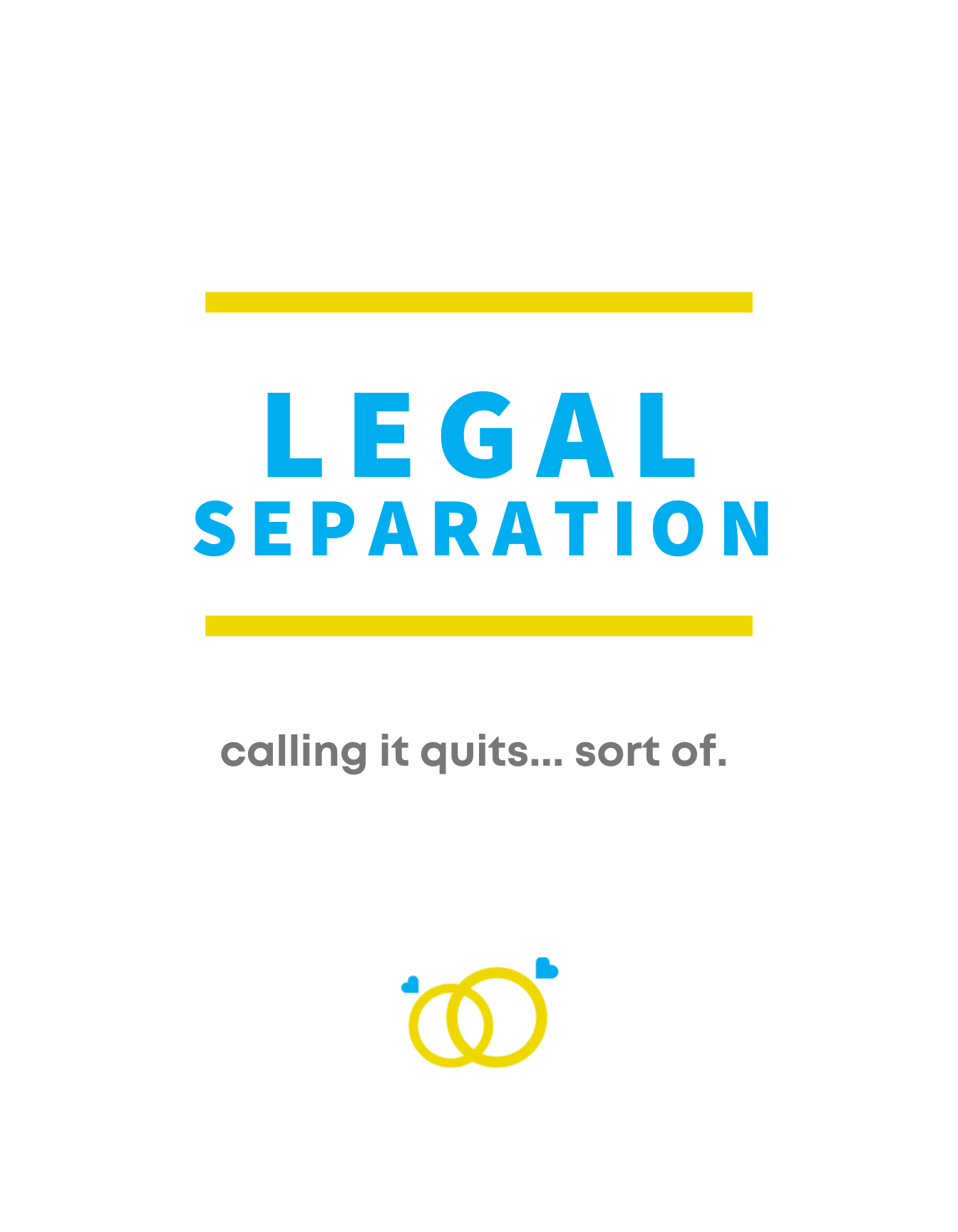When most of us think about a marriage coming to an end, we think divorce. However, there are alternatives out there that you may not know about. Ever heard of legal separation? What is that all about? Let’s dive in and find out!
As many of us know, divorce is the process of officially ending a legal marriage. After divorce, the marriage is O-V-E-R. Legal separation, on the other hand, provides many of the benefits of divorce (i.e. separation of assets, child custody arrangements, spousal support) but at the end of the day, you are still married. To hammer this point home, this means if you fell head over heels for someone new after the legal separation, you would not be able to legally remarry because you’re still in a legal marriage.
Legal separation, similar to a divorce, is a legal process conducted in court. While any couple can informally separate for any length of time, to legally separate, you must petition the court – just like a divorce.
Why Legal Separation?
So, if the processes of divorce and legal separation are so similar and carry many of the same benefits, why get a legal separation at all? This comes down to personal preference. There are tons of reasons that a married couple may want to remain married while also moving on and leading separate lives. For example, maybe one spouse needs to be covered under the other spouse’s medical insurance plan. Obtaining a legal separation may also be a form of estate planning. Surviving spouses are entitled to many benefits such as social security and pension payments as well as inheritance.
Some couples also have religious beliefs which don’t allow for divorce. In that case, a legal separation allows them to tie up all the loose ends of the marriage and live separately while remaining legally married. For other couples, especially those with children, it can be difficult to hit the nuclear button and go straight to divorce. A legal separation may help soften the blow at first. After getting a legal separation, many couples later go on to officially divorce.
Legal Separations are Reversible
Another enticing benefit of legal separations is that they are reversible. The same cannot be said for divorce. Once you’re divorced, you’re divorced. Bing, bang, boom. Done. Legal separation presents options. Many couples who legally separate do go on to file for divorce. However, some take the opposite route and reconcile. That is great news! And, more good news; the process of reversing a legal separation is pretty straightforward assuming both spouses are on board.
Not Every State Offers Legal Separation
While legal separations are becoming more and more popular for many of the reasons cited above, there are states that do not offer these options to their resident couples. For example, Florida, Georgia, Texas, Mississippi, Pennsylvania, and Delaware do not recognize legal separation.
Prenup Considerations
When it comes to division of property and awards of spousal support, legal separations are very similar to divorces. The good news is that your prenup can apply whether you legally separate, divorce, or both! So even if you have strong beliefs against divorce, it never hurts to square away your finances in the event of a legal separation. And, it will streamline the process should it occur. When drafting your prenup, it may be prudent to include a provision stating that the prenup applies in cases of divorce or legal separation – if that’s an option in your state.
All content provided on this blog is for informational purposes only. HelloPrenup, LLC (“HelloPrenup”) makes no representations as to the accuracy or completeness of any information on this site. HelloPrenup will not be liable for any errors or omissions in this information nor for the availability of this information. These terms and conditions of use are subject to change at any time and without notice. HelloPrenup provides a platform for contract related self-help. The information provided by HelloPrenup along with the content on our website related to legal matters (“Information”) is provided for your private use and does not constitute legal advice. We do not review any information you provide us for legal accuracy or sufficiency, draw legal conclusions, provide opinions about your selection of forms, or apply the law to the facts of your situation. If you need legal advice for a specific problem, you should consult with a licensed attorney. Neither HelloPrenup nor any information provided by Hello Prenup is a substitute for legal advice from a qualified attorney licensed to practice in an appropriate jurisdiction.
Julia Rodgers is HelloPrenup’s CEO and Co-Founder. She is a Massachusetts family law attorney and true believer in the value of prenuptial agreements. HelloPrenup was created with the goal of automating the prenup process, making it more collaborative, time efficient and cost effective. Julia believes that a healthy marriage is one in which couples can openly communicate about finances and life goals. You can read more about us here 

Julia Rodgers is HelloPrenup’s CEO and Co-Founder. She is a Massachusetts family law attorney and true believer in the value of prenuptial agreements. HelloPrenup was created with the goal of automating the prenup process, making it more collaborative, time efficient and cost effective. Julia believes that a healthy marriage is one in which couples can openly communicate about finances and life goals. You can read more about us here Questions? Reach out to Julia directly at [email protected].

0 Comments